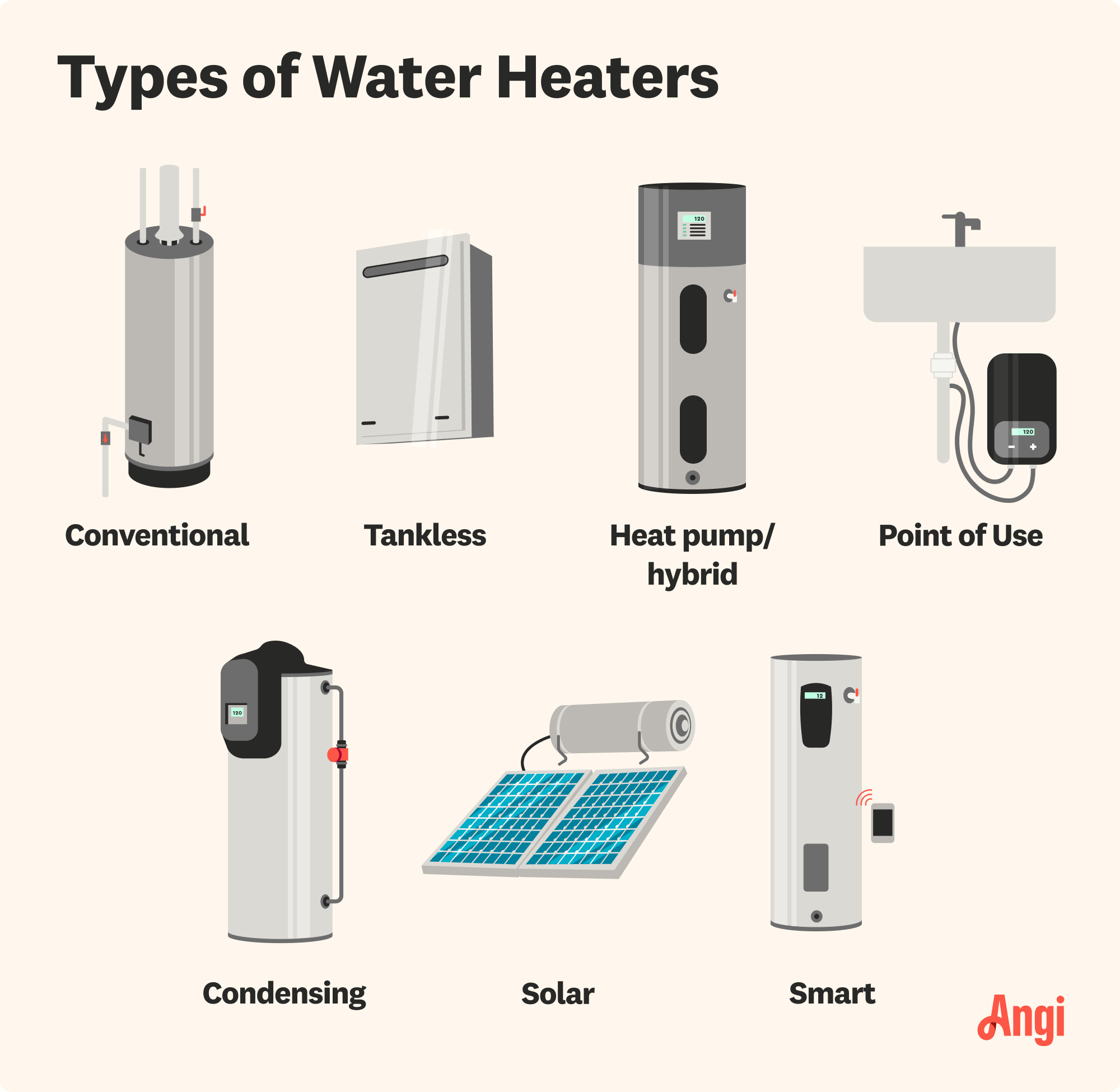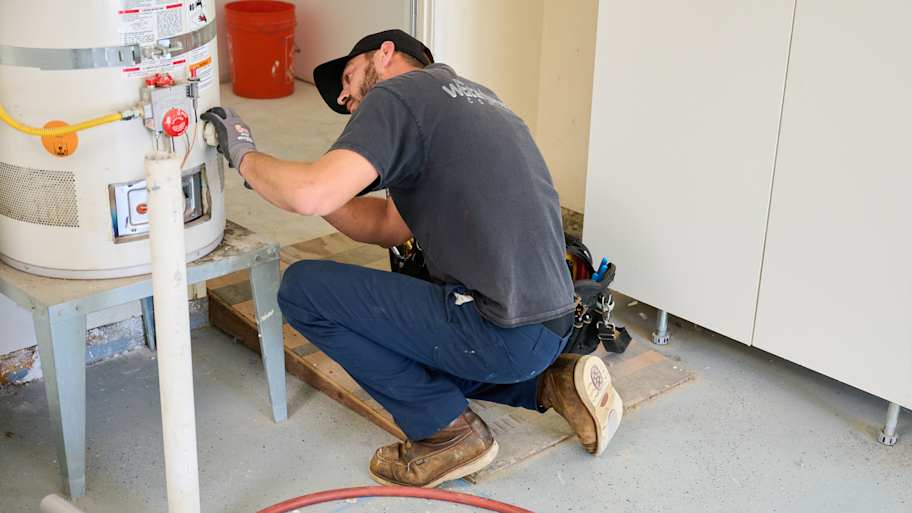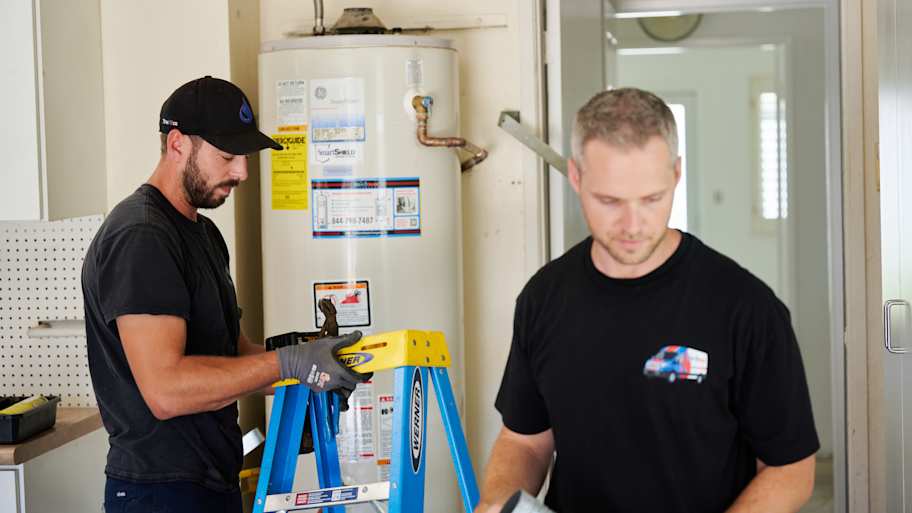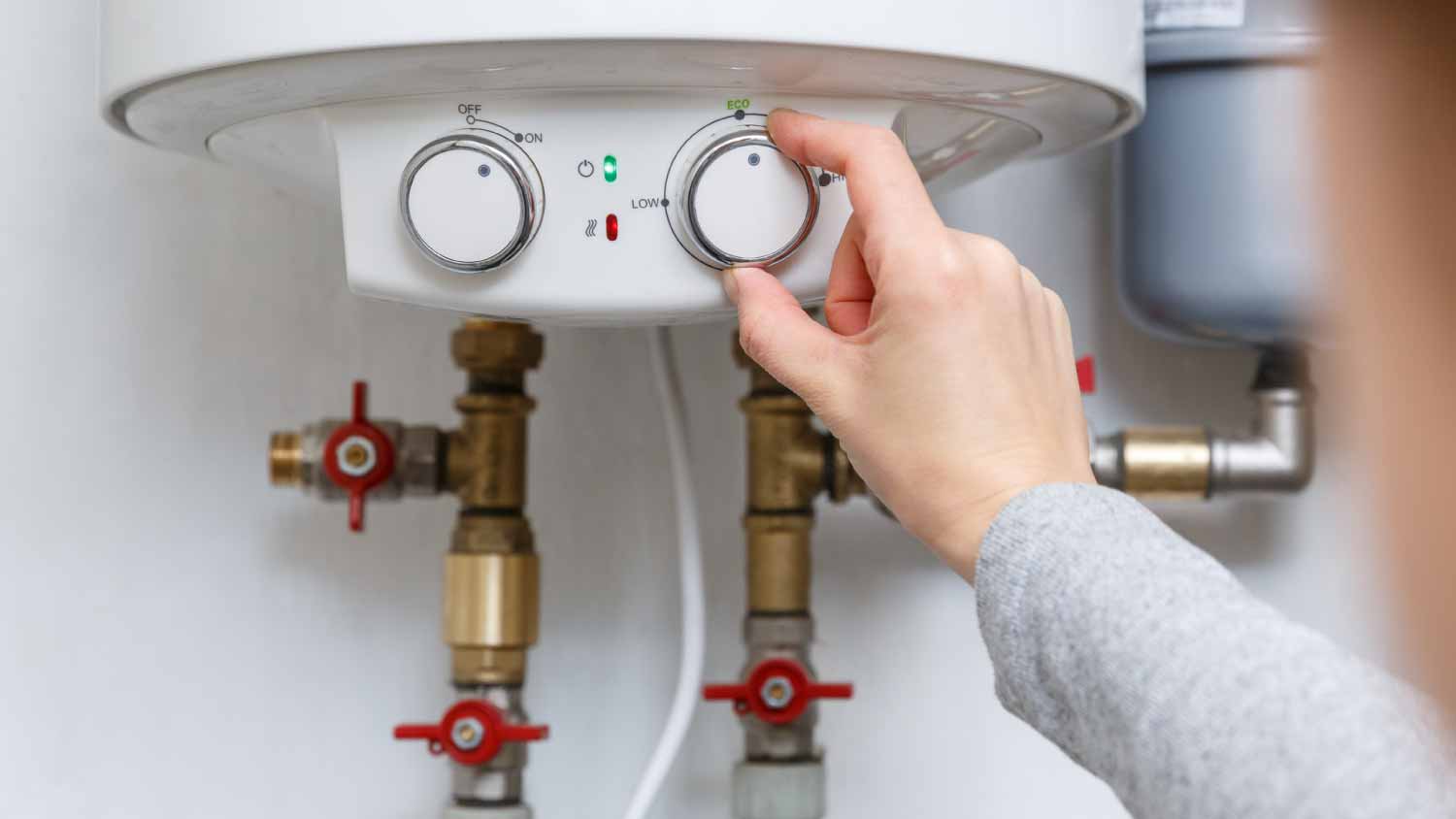Who Fixes Water Heaters? Find a Pro to Get Your Hot Water Running Again
Who you gonna call? Pro plumbers!


Cold showers, rusty water, and weird noises coming from your hot water heater are all signs that it’s time to call someone to fix it—but who fixes water heaters? The short answer is that plumbers typically service water heaters, whether it’s gas or electric. An electrician may also be able to fix an electric hot water heater, assuming the problem is electrical. Maybe you’re wondering if you can DIY the solution or if you need to call a water heater pro. Let’s take a look at the benefits of hiring a plumber or electrician.
Benefits of Hiring a Plumber for Fixing Water Heaters
Choosing to call in a professional plumber probably involves weighing several factors—cost being one of the heaviest ones. Some DIY-able home repairs can indeed save you a lot of money by figuring it out and doing it yourself. But repairs for plumbing and electrical should really be done by licensed professionals. Although paying a plumber to fix your hot water heater costs more, consider the additional benefits beyond having that hot shower on standby.
Tools
A plumber is going to have the right tools for the job. You may have some of the tools around, but a plumber will surely have all the tools, including specialized ones that most homeowners don’t have on hand. You may be able to rent some of the tools, but not always. Not only can the tools be expensive to rent or buy, but it also takes time to get them and learn how to use them properly, which brings us to the next benefit of hiring a plumber: saving your valuable time.
Saving Time
As with any professional, the benefit of hiring a licensed plumber to fix your water heater is that they know what they’re doing. Plumbers have training, education, and experience with diagnosing and fixing hot water heater problems. This knowledge translates into getting the job done right and much more quickly than the usual DIY process of researching and following steps in a video or an article.
Safety
You can save time by hiring a plumber to fix your hot water heater, and you have the peace of mind that it’s done right. Regardless of what type of water heater you have, gas or electric, working on them can be dangerous. Doing the job incorrectly can also be dangerous, as gas leaks or improper electrical work can present a serious danger to you and the people and pets in your home. Poorly done electrical work can cause fires and electrocution risks. The bottom line is that hiring a professional plumber for this kind of work is safer.
To prevent carbon monoxide exposure from a water heater, make sure it is properly ventilated. You should also have it inspected and cleaned every year and install a carbon monoxide detector nearby. If you smell gas—which can mimic the scent of rotten eggs—evacuate immediately and call your gas company.
Guaranteed Work
If there happens to be a problem after the water heater has been fixed, you can call the plumber back to correct it. Make sure you ask your plumber about their policy on this before hiring them, but most licensed plumbers will guarantee their work.
Relationship
As you’ve probably found out on other home projects, or you’re discovering on this one, it can be stressful to figure out who to hire for the repairs and tasks you need a pro to do. Hiring a plumber to fix your water heater can be the start of a great working relationship. Not that you plan to have loads of plumbing problems, but they’ll pop up over the years. After this, you’ll know a plumber you’re comfortable working with, and you’ll know who to call for any other plumbing you may need done in the future.
Can I Hire an Electrician to Fix a Water Heater?

If you have an electric water heater, the likelihood of an electrical problem is much higher—although gas water heaters can also have electrical issues. As mentioned above, an electric water heater has an internal breaker and many more electrical components that may need repair or maintenance. If you’re not seeing discolored water, leaks, or hearing noises coming from the unit, you may have an electrical issue that an electrician can fix.
For comparison, an electrician charges $50 to $100 per hour, and plumbers cost $45 to $200 per hour (though be warned, emergency plumbers cost 1.5 to 3 times as much, depending on when you call them). Each hourly labor rate will depend on the actual problem with your water heater as well as the experience and expertise of the plumber or electrician.
How Do Plumbers Fix Water Heaters?
To fix a water heater, a plumber will inspect the unit, checking for some of the most common water heater components that need a repair on hot water heaters, such as the anode rod, thermostat, thermocouple, gas valve, or testing the water to determine if it needs to be flushed. A leaking tank almost always means you’ll need to replace the entire water heater.
Once the plumber identifies the problem, they will let you know what they found and present a recommendation for repair or replacement. When maintained properly, tank-style water heaters last about 10 years, and tankless water heaters last about 20 years. If yours is near the end of its expected life span, it may be time to replace it, as repairs are likely to become more frequent.
How Much Do Water Heater Repairs Cost?
Depending on the repairs needed and the type of water heater in need of repair, expect the following cost ranges for different hot water heater repairs or replacements:
Plumbers typically charge from $45–$200 per hour
Repair a tank-style water heater: $225–$980
Replace a tank-style water heater: $600–$2,500
Repair a tankless hot water heater: $220–$975
Replace a tankless hot water heater: $1,200–$3,500

Fixing a Water Heater Yourself vs. Hiring a Pro
Some water heater repairs are simple enough to DIY. For example, if your electric water heater isn’t working properly, the remedy may be as simple as pushing the reset button to reset your water heater. Similarly, a problem like a water heater not draining could be caused by a clog that's pretty simple to fix. However, that may be a sign that it’s time to call a plumber or possibly an electrician to inspect the unit’s built-in breaker.
On the other hand, a licensed electrician should do many hot water heater repairs. When repairs call for working with gas lines and valves, exhaust vents, or electrical, consult a licensed plumber to diagnose the problem. In most cases, you should also hire a plumber or local water heater repair pro to do the work.















